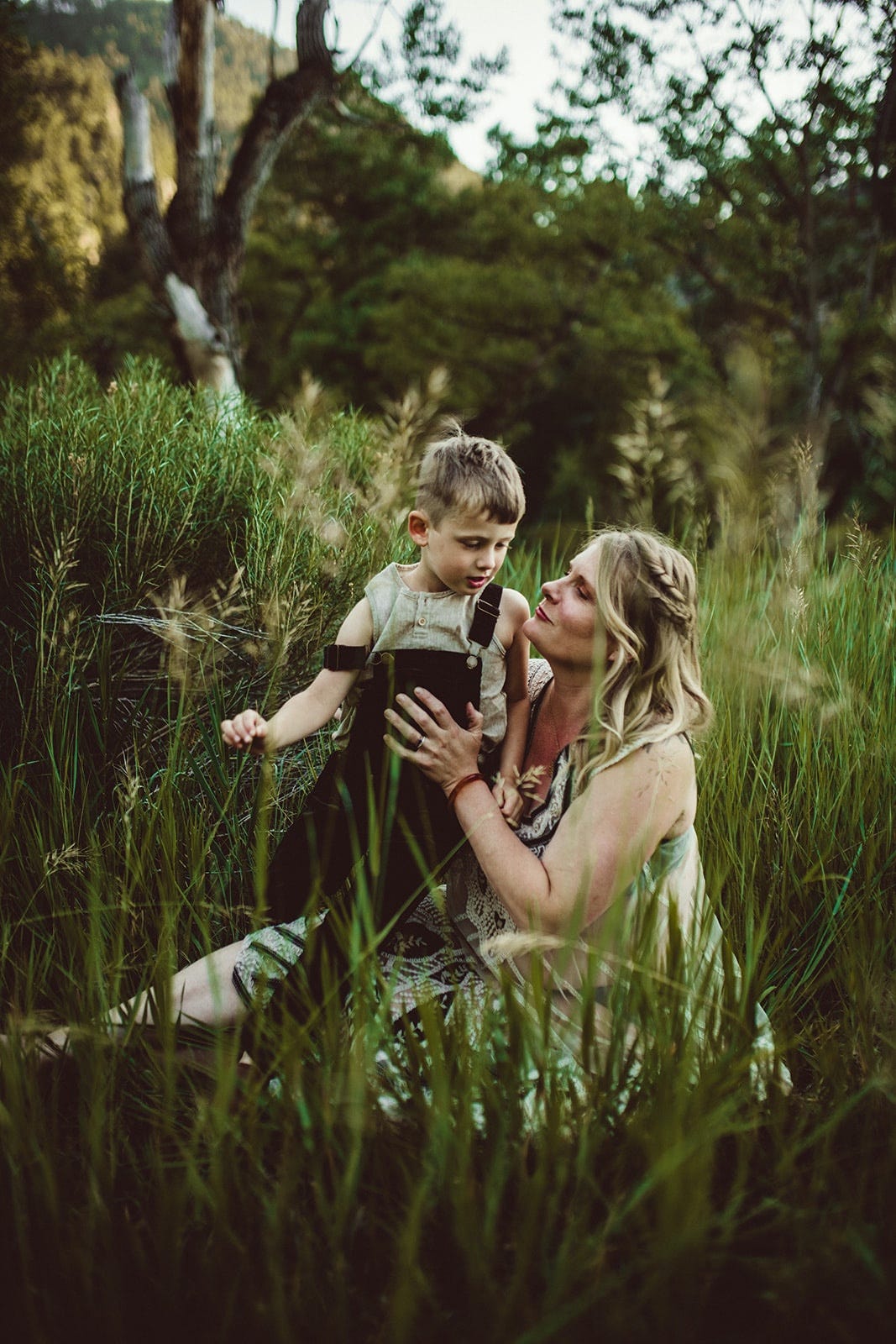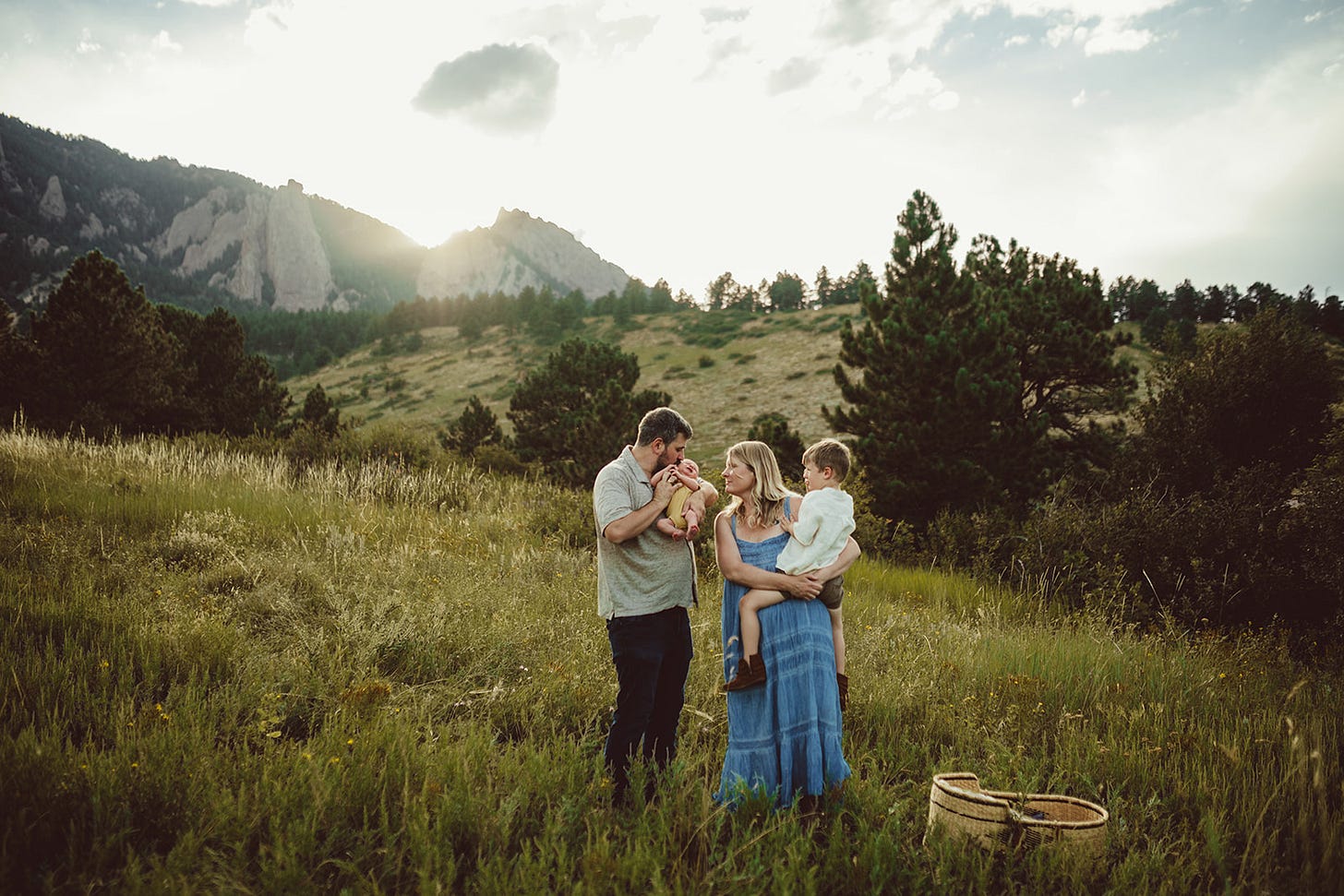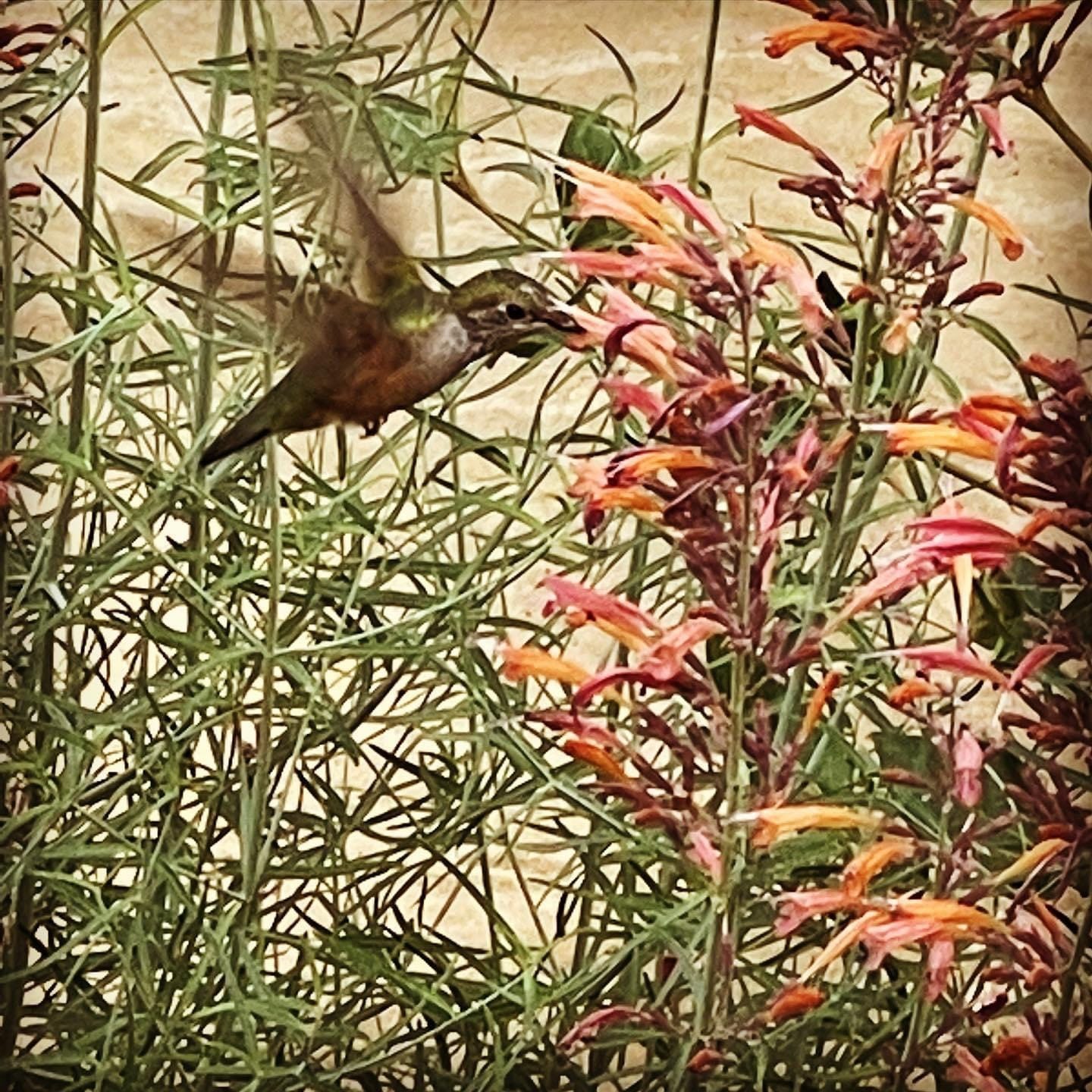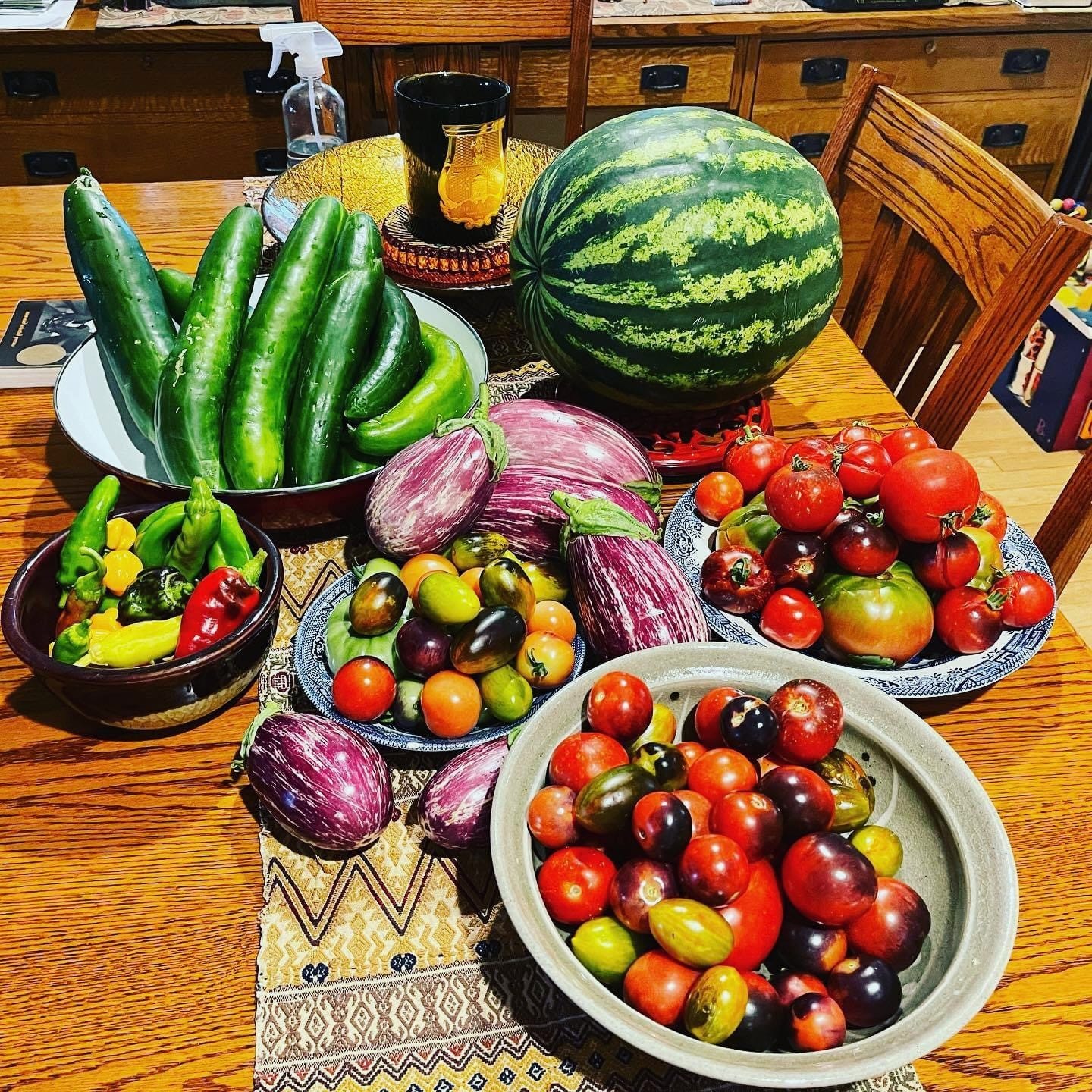Hi friends - today I bring you the final post in our Spiritual Practice series, and boy what a beautiful conclusion it is. Vanessa Nickerson and I were in the same nonfiction MFA cohort at The University of Arizona and my first memories of her are the kindness she showed me and the menagerie of pets she kept in her Tucson apartment! No surprise, then, that she continues to cultivate a close relationship to the natural world, these days in the form of a garden which she shares with her children. I am grateful to Vanessa for her abiding friendship and for her powerful voice.
I have dearly loved this series on the spiritual practices that sustain everyday life for the writers who have been generous enough to share their hearts, and I hope you have found value in it, too. (You can find a complete list of posts at the end of this one.) Being in conversation with fellow artists, writers, and humans is a life-giving practice for me, and I have enjoyed making my little corner of the internet, modest as it is, more of a collaborative space. I also look forward to being back in direct conversation with you starting in June. xoxo - Nishta
My son was three when he began to talk to the trees in our yard and give them names. He sat next to the rough bark of the enormous emerald ash tree in our back yard, under the green branches that stretched their shadow over our roof, he told me that the trees could hear him. “This is Mars,” he said, as he stroked its bark and told me that he knew that Mars would always protect him. He felt, when he was too young to truly understand, that trees, too, have memories. That the tree upon whose roots he sat could reach out those roots and feel. That if he watched and listened very closely, he could hear its heart beat.

When Darrow was born—as I lay awake at nights stroking the down on his head, when the sound of his cries consumed me and he would not be soothed, when the heart-breaking emotion of being his mother became near unbearable for the wanting so wholly to protect him from the brutality of human existence, I felt the trees whisper again. It was Darrow—the very presence of his little body in the world—that brought me home to the land.
I grew up in the old growth forests on the Northwest Coast, in a fantastical archipelago of abundance, where the trees loomed so large over my curious child-body that I knew they were possessed of wisdom beyond any knowledge I might ever hold. I have memorized the smell of those waters and coasts, the islands that punctuated the horizon. The spray of sea salt that left its fine film on the skin of my face, then dried into white crust on my cheeks. When I stood still after hiking into the looming evergreen shadows of spruce and ferns, when I held my breath to hush it, I could hear the land around me speak—the wind and waves as they spoke to the shore. I could feel the earth cry as roots tore from its surface, then sigh as a fallen giant returned to the ground to be cradled by moss and ferns. The sweet smell of decaying leaves and the mushrooms that helped return wood to the earth beneath. The land whispered to itself, decayed, grew anew. The landscape held me close. It tended me. So gentle yet ferocious its nature that it bound me to it forever—so that when I was growing each of my sons inside of me, far from that land, I wanted to consume it the way it had consumed me and feed it to them. Wanted to eat only seaweed and sea asparagus, to tear raw bits of the salmon I caught in childhood apart with my fingers and place them in my mouth. Wanted to drink salt water from seashells, suck the sap from bark.
When I was a child, I knew that trees were gods. Knew that the ocean sang for them. That every fern that grew beneath them could feel the vibrations of their roots as they reached out to each other in chorus to sing a mysterious hymn underground. As I walked upon those coasts, those forests planted themselves inside of me. I cannot escape the memory of that soil – the wet, moss-covered mud, the feel of my spade-shaped hands as they dug worms from beneath their cover. The way the land felt holy.
At ten, I was torn from the Pacific and carried across the border to the East Coast, a few states north of the North Carolina home we had left behind when I was an infant. I was set down and made to endure in the verdant, affluent suburbs near the concrete and marble Capital, where buildings and monuments cast their postcard shadows across green spaces. I forgot the smell of the old-growth forests after the rain. Forgot the feel of my hands in wet soil for too long—it no longer felt like mine. I sat sullen as we drove to civil war battle sites, went for long walks in the hot sun across open fields once watered by the blood of dying men, where cannons still stood. I did not confess that the land I had left behind ached me like an amputated limb.
But this too, forever etched behind my eyelids: The image of my excommunicated Catholic Mama each spring, her back bent over her knees in our garden. How she woke early in the morning—and still does—before the humidity could press its wet fabric over her breath. How she would toil in the dirt, sweat on her brow, shirt soaked through. The near-frantic pulling of weeds—her penance to the garden. A need I did not yet understand. Like her belief in God.
My sister began to grow plants when she moved South for art school. After she had been broken, mended the cracks, then broke once again, and again. She began to put her hands into soil. Between the phone calls at night about the door broken down and threats endured, the calls to police for protection—the panic and tears, she began to plant seeds. And then, the calls in the morning about the flowers beginning to bud. How each time she hurt, she found something to grow. A fig tree for the dead cat. How she created a chaotic jungle in pots on her Savannah porch, forgot to clean the dirt from her long fingers, and sang to the plants. Tom Waits, she said, made them grow, though the crepe myrtle was partial to David Bowie. Every evening, a lullaby for flowers and fruit. Her hysterical cries when the landlord called and demanded she clear her garden from the porch because the planting—the broken pots, the dirt, their chaos—had taken over.
Late at night, when sleep will not come or I wake from a fear I cannot define, I find myself in the garden, in the dark. I rake away the mulch to scatter wildflower seeds, plant groundcover so that it may crawl over mulch and turn the backyard green. Stealth-planting by the light of a headlamp. Digging deep into stubborn clay. This need I have—to put my hands in the dirt and quiet the turning of my mind. How the quiet of the night, the insect songs, soothe me as I plunge my spade into the ground.
When we lost the first baby after Darrow, I did not weep in my garden—I fell down into its soil and shattered. It did not mind my heaving. When we lost another tiny life, then another, and another, when we lost hope, it gave comfort and a place for me to exhaust my pain-wracked limbs. When we buried the hurt deep down and turned inward and away from one another because the pain of vulnerability became too much to bear, the garden let me entomb my grief in its soil. When I felt that I had ravaged our contentment, the garden let me grow beauty from the wreckage. It let me lay down my burden in its beds and nourished our family with food grown from its soil. Over and over I got down on my knees and tended the vines. As I nurtured the garden, ever so gently, the garden taught me to stop. To leave my mind and enter my body. To look at the splendor around me, to soothe myself with the smell of fresh-turned soil, to cast my eyes upon every detail of a leaf, to hear the sounds of the earth living. To be still, to look around me rather than behind or ahead.
When my second son grew inside my belly, determined to be born into the world, I fed him vegetables and fruit from the beds his brother and I had planted, the sweet taste of cucumber and watermelon like a balm to the wounds we endured to bring Milo into the world.
We planted the garden for Darrow. So that he could plant seeds and watch them grow, while all around him, people covered their faces in masks and distanced themselves from one another as the pandemic took life after life. Torn from the company of other children for a year and trapped in the small universe of our home and its yard by a threat carried on the air that he could not yet understand, he grew restless. When the streets grew empty, and the schools closed, when planes stopped flying overhead, when fear and claustrophobia settled in around us, my husband and I began to pull the endless tangle of weeds from our lawn. Then, we began to plant. Until one day, we had surrounded our home with a sanctuary. As weeks passed with aching length, each day, we went into the garden and basked in its tranquility. Darrow, who so often struggled to be still, was quiet in the garden. Watchful. As I sat on the porch and took in the eerie quiet of the empty street, he sat in the garden amongst the penstemon we had planted and held trusting bees gently in his small hands. He watched in quiet wonder as butterflies coasted from bud to bud and landed on his shoulder. He laughed in delight at the frenzied beat of hummingbird wings as they circled around him. As though he was not a child at all, but another sacred green stem grown from the soil. How in each moment alongside my child and his innocent wonder, I felt such profound grace.
I helped him plant seeds for watermelon and zucchini, beets and carrots, chard and peppers. He visited his garden each day and watered his plants with such tenderness. In those days of solitude, we found company among the plants. Knew that we, and they, were two small parts of a boundless, incomprehensible whole. His gentleness grew a bounty. We picked tomatoes from the vine let their sweet juice and seeds run down our chins and back to the ground.
Tomorrow, we will put our hands in the ground and plant our garden once again. Our garden is only a small piece of land. But it is enough. Enough to enough to provide solace and a tranquil place to rest our bones, enough to feed our bodies and ease our minds, enough to revive us when the weight of life becomes too heavy. It is small, but it knows enough to teach us that life on this planet depends upon harmony. That our very existence depends upon our relationships to one another. That the great regenerative waltz of species and organisms our garden performs each Spring depends upon harmony.
When I dig my bare hands into the earth, the earth moves to make way for my hands. Even a hard rock cracks if one asks it to return to the soil. When I dig my bare hands into the earth, it welcomes me. So, when I take part of the earth home with me under my fingernails, and let it last there, just a little while, as a reminder of what we have done together, the earth does not mind. In this rigid world, full of impenetrable surfaces, in which so many nurture the principals we thought our predecessors had weeded; in these moments where we find ourselves so disconnected from other humans by the blue light and trepidation between us: the earth moves to make room for my hands. And it listens, as it has since I was a baby crawling among the Carolina pines. It has always. What it says to me is that we must be quiet and still to hear how life unravels and reshapes itself. That we must hush ourselves to notice the ground—the life pushing forth after the wildfire, the beating of insect wings, the pollen upon the bee, the dandelion seed as it floats away, the music the aspen makes in the wind, the falling branch. What it says to me is that it will move always, even when I cannot, and that tiny roots will reach out and embrace me when I am gone. What it says to me is this: I am here. Be still and take in the wonder. We are connected, always. Stay with me, for a short while, and grow. Grow, like I have. For so, so long.

Vanessa Nickerson practiced public service law for a decade before recently returning to writing. She is a member of the Denver Press Club and hopes to have a future in the library sciences. She lives (and gardens!) in Colorado with her family: husband Jeff and their two sons, Darrow & Milo.
Previously in this series:
Research As a Spiritual Practice by Rebecca Clarren
End-of-Life Care As a Spiritual Practice by Laura Stephens
Acts of Service As a Spiritual Practice by Katie Vhay
Sewing As a Spiritual Practice by Burke Butler
Dreaming As a Spiritual Practice by Amber Ambrose
Riding Horses As a Spiritual Practice by Shelly Taylor
Music As a Spiritual Practice by Preetha Narayanan






Perfect timing. I’ve been in a gardening frenzy trying (for the third time or so) to plant a garden that will yield vegetables in this climate where we get no rain from late May to November. Nothing like the humid Midwest landscapes where I grew up! We rent. The sun gets sooo hot. Listening to the land and adapting to it is the way, I think.